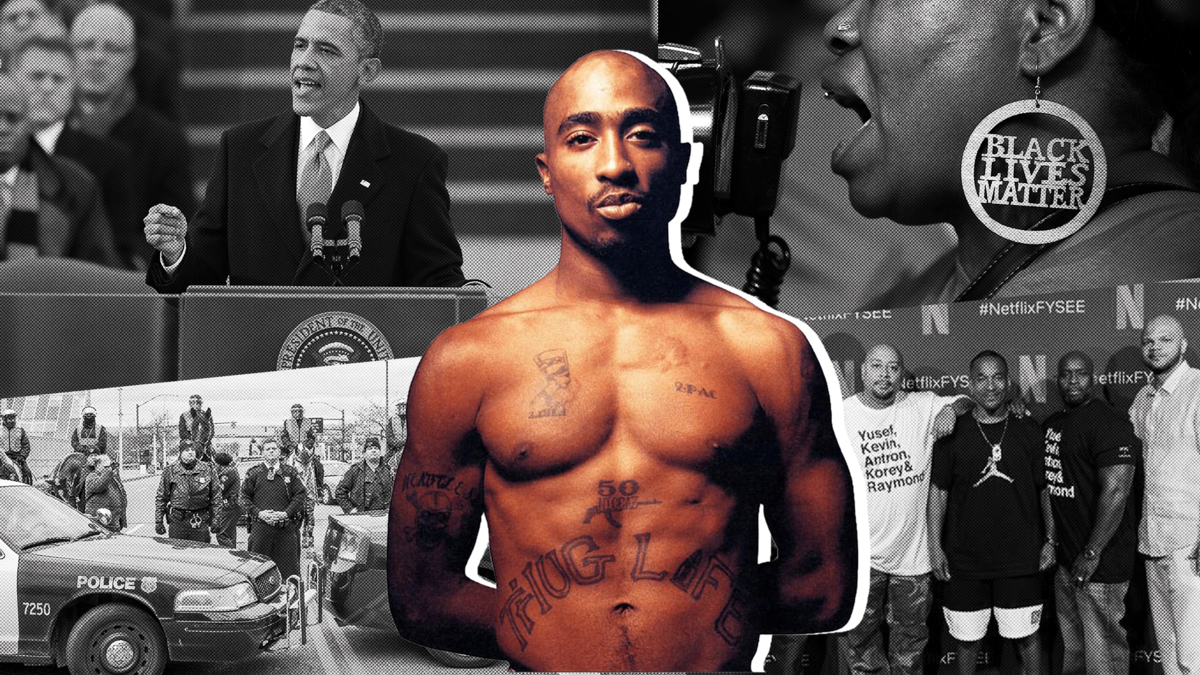As we recognize the late great Tupac Amaru Shakur on the 23rd anniversary of his passing, we zone in on his song, “Changes.” Originally recorded in 1992 and released posthumously in 1998, the record highlights a list of societal issues that include police brutality, poverty, racism, the misguided war on drugs, general warfare, mass incarceration and messy politics. Ultimately, the track urges our country to right its wrongs and make changes for the better.
Tupac, who often boasted an unfiltered but necessary approach to advocating for underrepresented communities, was and still is a martyr. He displayed no fear in the face of political or societal opposition and had no problem calling out the powers that be. “Changes,” which was nominated for “Best Rap Solo Performance” at the 42nd Annual Grammy Awards in 2000, does just that. It highlights several issues that were not only prevalent during Tupac’s era, but remain problems that need to change if we ever want to truly discover equality and world peace.
Ultimately, the issues rapped about in "Changes," still need changing. To start the song off, 'Pac brings the constant battle between Black people and law enforcement to the forefront.
Police Brutality
Cops give a damn about a negro / Pull the trigger, kill a n***a, he's a hero
Despite the constant cry from the Black and brown community to place more accountability on the police for excessive force, police brutality remains a dire issue.
According to a new study conducted by Frank Edwards, of Rutgers University’s School of Criminal Justice, Hedwig Lee, of Washington University in St. Louis’ Department of Sociology and Michael Esposito, of the University of Michigan’s Institute for Social Research, "Roughly one-in-1,000 Black boys and men will be killed by police in their lifetime." Although this data is alarming, it’s unfortunately not surprising. Countless cases have resonated in the media regarding our Black brothers and sisters, who have been gunned down when confronted by law enforcement. From the uproar in Ferguson, Missouri, over the killing of Michael Brown, to the mysterious death of Sandra Bland following an unwarranted traffic stop, and the unlawful use of excessive force which led to Eric Garner’s death, there have been numerous examples of negative interactions between the law and our Black people.
Racism
I see no changes all I see is racist faces / Misplaced hate makes disgrace to races
Through these lyrics, 'Pac shares his belief that hate has been misdirected toward people instead of toward the central problems at hand. It’s unsettling to admit that the current political climate we live in, under the administration of our current president, has caused our nation to take backward steps by embracing bigotry and prejudice instead of racial equality. On a frequent basis, Trump rallies produce more acts of disgust than previously seen in daily politics. Additionally, conservatives, Republicans and individuals who would once hold their tongue when wishing to spray racist remarks have now felt empowered to boast in their bigotry.
A Black President
And although it seems heaven sent / We ain't ready to see a Black president
During the '90s, Tupac believed that although our country would have loved to have a Black president, we were not prepared to actually have one. It is left up to interpretation as to what he truly meant, but many believe that he was referring to how Americans would react to having a president of color. In 2008, history was made as President Barack Obama began what would become a two-term tenure overseeing our country. However, as we ushered in our Black president, our country’s racial ills became more glaring and evident. Hateful statements and acts of racism were consistently made against Obama and his family. If you interpret Tupac’s words in the manner above, it’s unfortunate to see how accurate he was. Our country has a long way to go before it is morally and ethically ready to treat a respectable president who is a person of color just the same as a decent white president.
Mass Incarceration
It ain't a secret, don't conceal the fact / The penitentiary's packed and it's filled with Blacks
Just like 'Pac states, it’s no surprise that the United States has one of the largest prison populations in the world. However, no sweeping changes have been created to fix the problem concerning the disproportionate number of Black and brown people who end up in prison compared to those who are white. More recently, filmmaker Ava DuVernay’s Netflix miniseries When They See Us gave a detailed and jarring look into the case of the "Central Park Five," who are more aptly known today as the "Exonerated Five." Similar to various minorities who have been wrongly accused and jailed for crimes they did not commit, the story of Kevin, Antron, Yusef, Raymond and Korey reminded our nation that merely 20 years ago, young teenagers of color were subjected to a political and judicial pressure that was immoral and unjust. Today, Black and brown people continue to be incarcerated for minor or petty offenses in which whites often receive more lenient sentences or slaps on the wrist.
Altogether, as we remember Tupac — the man many grew to love as a poet, artist and community advocate — let us not forget his passion for addressing the issues that affect minorities near and far with the hope for brighter days to come.
